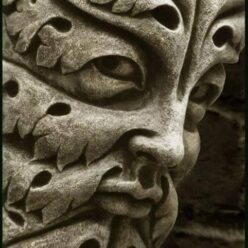They continued their walk to the Night Bus stop.
Michel pulled out a dark red plastic swizzle stick, with a stork embossed on it.
“A treasure of global significance,” Jesse said, glancing at it.
“We’re not much into stuff,” Michel said. “But I like this. It’s a souvenir. My capodecina took me to a nice club for whacking some guy.”
“From mobster to dog euthanizer,” Jesse said. “What a career you’ve had.”
“You can’t hurt my feelings,” Michel said. “Kima’s here in town at the same time as me.”
“Have you stopped killing people?”
“I’m even a vegetarian now,” Michel said.
“What?”
“I used to kill and eat animals. I never was as fond of cats as … never mind. Anyway, I don’t anymore,” Michel said. “And George says that while I was living in Montréal I had ‘diminished moral capacity’.”
“Montreal has that effect on some people,” Jesse said. “Mike Wilmot once said it was ‘like Disneyland for alcoholics’.”
“I didn’t understand why it was wrong to kill bad people,” Michel said, as if the matter still confused him, but he’d changed his behaviour to avoid trouble.
“Now you pistol-whip them,” Jesse said.
“You prefer I turn him off with a lecture? Guys like that don’t learn until they meet a bigger bully.”
“But you’re still glorifying bullying behaviour.”
“If your heart has no muscle in it, how can it beat?” Michel said, rhetorically.
Jesse took a breath, expelled it, and then said in a tight voice, “I don’t want to live in a world where masculinity and bullying are so close to being synonymous. I don’t think you’ve got a heart at all.” He added, “And if you do, I bet I couldn’t tell the difference between it and a rancid hunk of gristle.”
Michel sounded prim now. “If I got no heart, it’s cause I never had one. I started life with a different set of assumptions than you, and I can’t rely on a heart to tell me how to behave any more than you can. I prefer George’s way of explaining things. I’m caught between two worlds. I love the human world of guns and cell phones and airplanes and loud noises and rockets. My love makes me an outcast.”
“You and Kima and George.”
“Ah, now you’re starting to see. We’re all freaky like that.”
“You and George are sharing her,” Jesse said, and immediately wished he hadn’t.
Michel took his time responding, and spoke with care. “Kima is the one with the final say. You say you’re polyamorous. Why would you say that we ‘share’ her, like a pizza, rather than have an understanding with her and each other, like we’re all people?”
After a decent pause, Jesse said, “I truly and seriously fucked up, dude.”
Michel’s reaction to this continued to be calm. “Kima’s not like other people. She does her own thing, and she and George have a project.”
“The twenty million dollar plan.”
Michel was quiet again.
More time passed than he would ever admit to before Jesse turned and realized that Michel was either gone or transparent.
He wasn’t that drunk. He got home okay.
Before he went to sleep he thought, I can’t drink when I’m around them. I get too desperate. I’m too obvious. I want to know everything. It’s the awkward stage. I know enough to be trouble, and not enough to understand what the hell is going on.
During his childhood, Jesse had eaten lies with his porridge, and splashed through lies in his bath. He expected lies, except from Raven, and his hyper-vigilance fought with his naïvety at every turn, so one minute he’d believe anything — and the next, he’d be back in his right mind, and filled with enervating cynicism. Then Raven would kick his ass, with “Cynicism is the game you’re forced to play when you admitted capitalism won. Ya gotta get up and let the hope back in!”
Worse than the cynicism, which was a mood, coming and going like weather, were the times when he thought he might be lying to himself. He thought that his childhood was a cramped and poisoned container he could not escape. Everyone thought he had escaped. That was the biggest lie of all. He told himself it was okay to cry.
Fuck that noise.
He started his breathing exercises and worked backward through his day.
He sat straight up like a marionette, eyes staring.
What the hell happened to the gun?
He lay back down, breathed deeply, sighed deeply, and tried to calm himself again. It didn’t matter. Michel had it, or he didn’t, and even if he did have it, it had no bullets.
He was drifting asleep, in a sweet state of safety, knowing his mother was hundreds of kilometres away, and she didn’t have his phone number or address. He was thinking about how he sometimes missed the chickens, and the cats, and then one of the riddles from The Hobbit came into his mind, and like a clockwork toy, he was sitting bolt upright.
Michel was exactly the kind of person who would be carrying around ammo. Perhaps even ammo for that bad boy Glock 17 that disappeared after the shooting.
He lay back down. “So he’s got a gun,” he said to his ceiling. “And maybe ammo. Do I sound worried? I’m not worried.”
There were plenty of other things to be worried about. Or perhaps ‘concern’ was a better word.
How do they know where the cameras are?
What is the true relationship between the three I know about?
Who’s Hermes, and will I ever meet him?
Are there more of them living in Vancouver I don’t know about?
